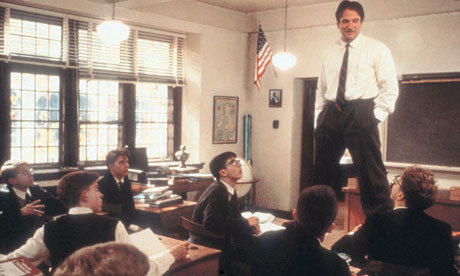Because I am tired, it is basically the last day of Thanksgiving break, and I just want to get this off my chest - I am condensing the last three points into one post. Yes.
4. Teaching is about finding the sweet and tender balance amidst insane chaos
Don't ask me how to obtain the balance, but feel free to ask me about the insane chaos.
As I walk the halls of my school, and engage with teachers with and without their classes, I notice something about them. A small flame of wildness tempered by wisdom and/or optimism, lighting from their eyes and faces. It is this tempered, or honed attention that I have not yet obtained. The teachers who have braved Education's valley of shadow and death (AKA the first three years) and emerged victorious appear to have this serene sense of calm -like a patient and wise mother waiting to listen to the sobbing child tell the story of a hurt knee or a distressed teenager moan about a rude boyfriend. In regards to reacting to the politically insane and economically humiliating circumstances around them they display a balance between brute animal instinct and sophisticated self-restraint (though I did witness some brute instinct earlier this year).
At this point I am not balanced, and I am trying to figure out how to get away from my basal instincts when faced with the extraordinary everyday challenges of teaching.
5. Educational technology is cool, but is it possible the field is turning a blind eye to the biggest issues?
Contrary to what I have thought in the past, I feel there are much larger and important issues in education than the next technology or learning theory. Poverty is the underlying issue for at least a quarter of American children. Is it possible that while we are learning how to teach students in virtual worlds, or use blogs and flipped classrooms to increase engagement and interactivity, we are just contributing to the opportunity gap that already stands between poor and rich kids?
At my school we do lots of computerized tests. Cool, it saves time! Not so cool, many of my kids don't know how to use a mouse properly.
I was delighted to find a host of amazing online resources when I started at my job, but then discovered that many of my students don't have access to the Internet at home.
It seemed like if we just had a growth mindset and went to work, then that well-researched concept would create some good results, and then I realized just my own mindset isn't enough to change 23+ in just a few months.
Do we have the responsibility to enable students in poverty to learn in the same ways and at the same rates as those who aren't?
6. Continued raw failure is the essential attribute of true learning
I have never failed so hard, so frequently, and so publicly in my life. I was not prepared for it, which made the descent down to mental, spiritual, and emotional turmoil much more difficult. Currently I am trying to allow my failures to teach me, rather than define me.
Perhaps the hardest and most bitter element of my daily inability to reach the level I yearn for is the impact of my short comings on my students.





